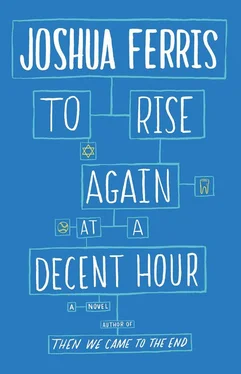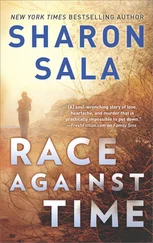And I didn’t say anything, and then I said, “Are you in love with him?”
And she didn’t say anything, long enough for me to know that she was. Then she said, “I don’t know, it hasn’t been that long.”
And I didn’t say anything, and then I said, “Is he Jewish?”
She didn’t say anything. I thought the question might be an irritating one and that she might let go of my hand, but she actually held it a little firmer and said, “Does it matter?”
It did matter, it did. He probably believed in God, too. But I didn’t say anything, and then I said, “I’m happy for you.”
And she didn’t say anything, and then she said, “Are you okay?”
And I didn’t say anything, and then I said, “Of course.” And I looked at her and smiled. But I had no control over the smile and everything it told her.
I wished it had turned out differently. I wished I had been better all around. I wished above all that when I believed something, like that I was finally over her, that I knew myself even the slightest bit.
A FEW MONTHS AFTER starting my first private practice in Chelsea, I wrote Samantha Santacroce an old-fashioned letter and mailed it to her parents’ house, confident that it would find its way to her because she was living, I assumed, just down the block, or at most across town, if not in her very childhood bedroom. I tell myself I don’t know why I wrote to her, but I do: I wanted her to know that I had a private practice, that I was a success, that I had put the misery of my childhood behind me and made it out of Maine. She would have been so lucky, I was telling her by way of that letter, to have stuck by me after I’d admitted that I was an atheist at the Santacroce dinner table, and to have married me. A few weeks later, I received a reply, via email — my YazFanOne account, which I’ve had since the days of dial-up — a reply I read so many times that you would have thought I was off at war. “What do you mean,” she asked, “you only wanted to be a part of things? You had every opportunity to be a part of my family. Didn’t you know that? You just had to accept my parents, and you never seemed interested in that. They weren’t going to stop being Catholics for you, Paul, which I think is the least you would have settled for, back then. You wanted everyone to come around to your way of thinking. You had really strong opinions, and you never gave an inch. As I remember it, you were more interested in being yourself than being ‘a part of things.’ And sometimes you’re not always, or at least back then you weren’t, the easiest guy to get along with. I’m sure now, with all your success, things have changed.”
I wasn’t at all sure, and so didn’t write back.
I’d seen a headline on one of the celebrity magazines while sitting with Connie in my waiting room. “Harper and Bryn Are Huge Family People,” it read. Harper’s heterosexuality was in hot dispute, while Bryn had had that bad stumble when her first three kids were removed by court order on the season finale of Bryn. But now they were together, according to a “source” and a “pal,” and expecting a child. I was happy that things had worked out for them when for so long they were such a national shitshow. I also admit to feeling jealous. Harper and Bryn were huge family people. For them, nothing was more important — not the haters, not the paparazzi, not the weight gain, not even the LAPD — whereas I had given up all the families I had known. I’d given up Sam and the Santacroces, and now, I thought, I’ve given up Connie and the Plotzes. Connie had moved on to Ben, and I would never be a Plotz and would never again have them for a family. Which was an absurd thing to think, because I’d never really had the Plotzes to begin with. The only people who ever had the Plotzes were the Plotzes. I was never going to have the Plotzes even if Connie and I had married, because I was an O’Rourke. The Plotzes would never accept an O’Rourke — not because I was not a Jew, but because, as an O’Rourke, I acted in ways that were weird and distancing. And now I had to contend with the fact that I wasn’t even an O’Rourke. I was a Boruch from Białystok, whatever the hell that was, and, according to the goddess in the Red Sox hat, not even a Boruch from Białystok but something even more removed. Harper and Bryn knew who they were, they were huge family people. Who was I?
“Dr. O’Rourke?”
Connie was standing in the doorway.
“When you get a minute,” she said.
I finished up with my patient and walked over to her.
“My uncle’s here to see you,” she said.
“Your uncle?”
“Stuart,” she said.
“Your uncle Stuart?” I said, taking off my white smock. “He’s here? Your uncle Stuart is here? I haven’t seen Stuart in how long? What’s he doing here?”
“I didn’t say a thing. He found out on his own.”
“Found out what?”
“I tried to explain.”
I was only half listening. The other half was wondering how I looked, if I looked put together, if I looked self-respecting.
When my father was manic, he would lift me off the ground and squeeze me in a big bear hug. Upon first spying Stuart, from the vantage point of the front desk, I wanted to do the same to him. He was sitting alone, hands folded in his lap, waiting patiently. I told myself not to hug. Look at him. You don’t hug a man like that, no matter the impulse. As I backed away from the desk, I almost stepped on Connie’s foot. Finding her there watching me watch Stuart through the front-desk window, and just after hearing that she was dating someone new, I knew that she took the full measure of me, and saw me for what I was, and knew the relief of being rid of me. I also knew that my excitement was absurd. The sight of Stuart should have brought me more sadness, nothing more.
He stood to greet me as I entered the waiting room. Just stop and hold out your hand, I instructed myself. Anything more would be inappropriate. But I didn’t. I couldn’t. I kept moving forward. I put my arms around him. He had none of my father’s bulk, and he hardly hugged back. I held on for as long as was acceptable — none of it was acceptable — a total of three or four seconds at most, being sure, before I let go, to slap him twice on his back, as if he was just an old buddy from the golf course and not the man I had hoped to sit next to during the Passover Seder.
“Stuart,” I said. “It’s good to see you again.”
He smiled, and perhaps only on account of my enthusiasm, his smile seemed warm and genuine.
“What brings you in?”
“Is there somewhere we can talk?” he asked.
“Of course!”
As I took him back, I explained, in a voice that was suddenly too loud, that when I moved out of my two-room clinic in Chelsea, I designed the new place, to my eternal regret, without a private office.
“So we’ll have to talk in here,” I said, gesturing him inside an open exam room.
Once in the room I pulled up a stool for him. He settled down quickly, leaning forward with his hands gathered serenely together. I folded my arms and leaned against the patient chair. I was reminded once again of how austere and commanding his quiet presence could be. I blurted out something stupid, of course.
“Are you here to take me up on my offer?”
“What offer is that?” he asked.
“A good cleaning. X-rays. Make sure everything’s in order.”
“No,” he said.
No, he had come to discuss what was being written in my name online. I shifted against the chair.
“I hope Connie told you that I’m not writing those things,” I said. “That’s not me.”
“She did.”
“Good,” I said. “Because that’s not me writing those things.”
Читать дальше












